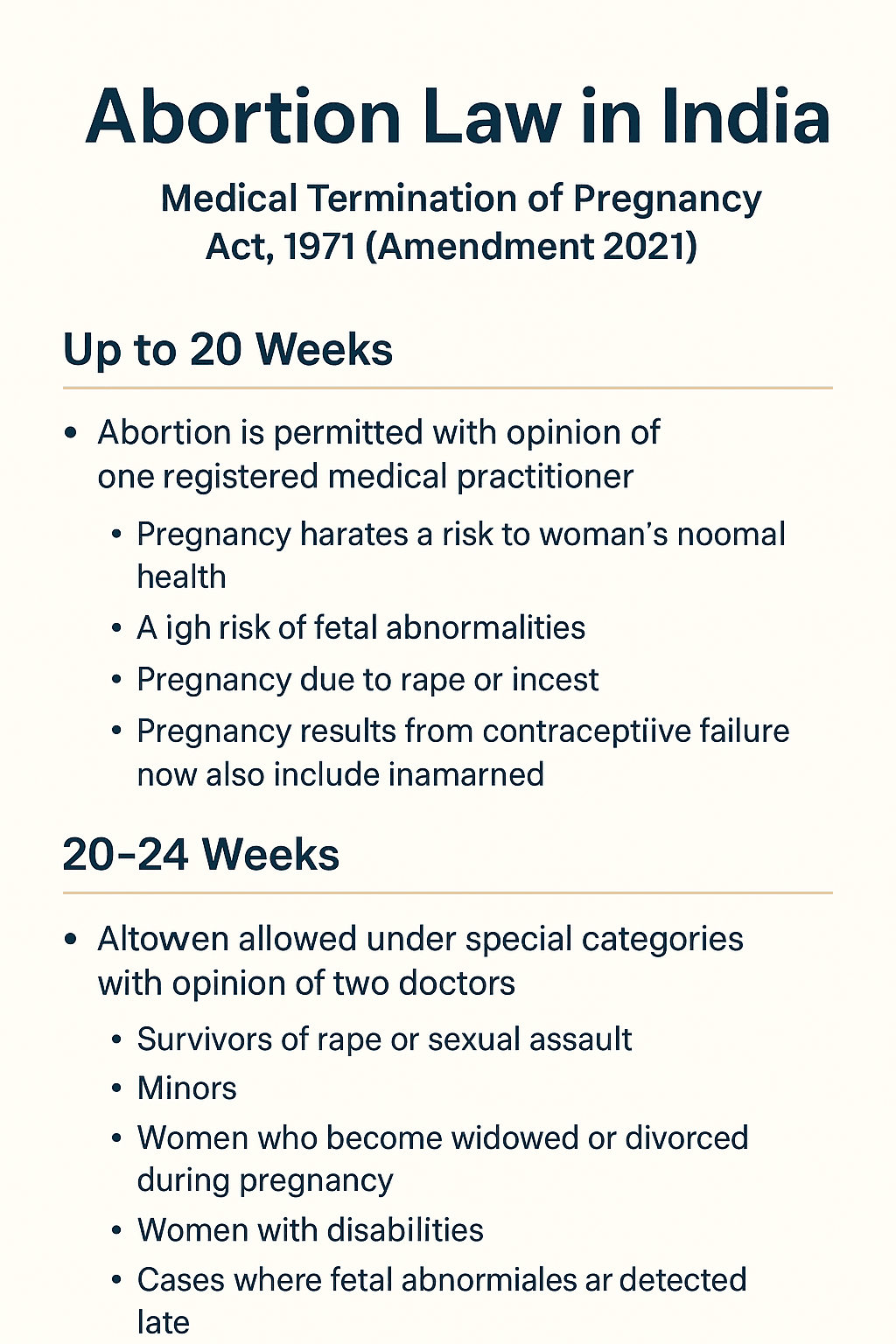
Abortion Law in India – MTP Act 1971 & 2021 Amendments Explained
Introduction
Abortion law in India has evolved over the years to balance women’s reproductive rights with healthcare regulations. The Medical Termination of Pregnancy (MTP) Act, 1971, along with its 2021 amendment, defines when and how women in India can legally undergo an abortion. The law emphasizes safe medical practices, protects women’s health, and provides legal backing for abortion under specific conditions.
What is the MTP Act, 1971?
The Medical Termination of Pregnancy (MTP) Act, 1971 was introduced to regulate abortions and reduce maternal mortality caused by unsafe procedures. It legalized abortion under certain circumstances, allowing registered medical practitioners to provide safe and legal abortion services.
Amendments in 2021: Key Highlights
In 2021, the Government of India introduced significant amendments to expand women’s access to safe abortions. These changes reflect progressive steps toward reproductive rights and healthcare equality.
 Key Changes in the 2021 Amendment:
Key Changes in the 2021 Amendment:
- Gestation Limit Extended: Abortion is now legal up to 20 weeks with one doctor’s approval and up to 24 weeks for special categories with two doctors’ approval.
- Special Categories Covered: Survivors of sexual violence, minors, women with disabilities, and individuals facing fetal abnormalities.
- Medical Board Approval: For cases beyond 24 weeks, a medical board must approve if severe fetal abnormalities are detected.
- Confidentiality Clause: The law ensures the privacy of women seeking abortion, with penalties for unauthorized disclosure.
- Wider Access: Expanded access for unmarried women under certain conditions, promoting equality.
Specific Conditions for Abortion up to 24 Weeks
Under the amended law, abortion is permitted up to 24 weeks if:
- The pregnancy endangers the woman’s physical or mental health.
- The pregnancy is a result of rape or incest.
- There is a risk of fetal abnormalities.
- Minors or vulnerable women are involved.
- Continuation of pregnancy would cause grave injury to the woman’s mental health.
Why This Law Matters
- Protects women’s reproductive rights.
- Ensures safe medical procedures.
- Reduces deaths from unsafe abortions.
- Promotes gender equality in healthcare access.
Infographic: Abortion Law in India (MTP Act 1971 & 2021)

FAQs
1. Is abortion legal in India?
Yes, under the MTP Act, abortion is legal up to 20 weeks (general cases) and 24 weeks under specific conditions.
2. Can unmarried women get an abortion in India?
Yes, unmarried women can access abortion services under the law.
3. Who can perform a legal abortion in India?
Only registered medical practitioners in approved facilities can perform abortions legally.
4. Is parental consent required for minors?
Yes, minors require the consent of a guardian.
5. Is abortion after 24 weeks possible?
Yes, but only in cases of severe fetal abnormalities, with medical board approval.
Conclusion
The Abortion Law in India, through the MTP Act 1971 and its 2021 amendment, ensures safe, legal, and accessible abortion services while protecting women’s rights. It is crucial for women to be aware of their legal rights and seek medical help from registered practitioners for safe abortion procedures.
Call to Action


 Key Changes in the 2021 Amendment:
Key Changes in the 2021 Amendment:








